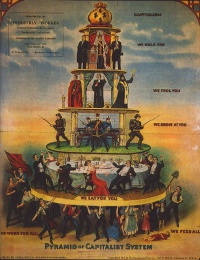Socialism of the 21st century
From The Art and Popular Culture Encyclopedia

Illustration:Liberty Leading the People (1831, detail) by Eugène Delacroix.

|
Related e |
|
Featured: |
Socialism of the 21st century (Template:Lang-es) is a political term used to describe the interpretation of socialist principles advocated first by Heinz Dieterich in 1996 and later by Latin American leaders like Hugo Chávez of Venezuela, Rafael Correa of Ecuador, Evo Morales of Bolivia, and Luiz Inácio Lula da Silva of Brazil. Socialism of the 21st century argues that both free-market industrial capitalism and twentieth-century socialism have failed to solve urgent problems of humanity, like poverty, hunger, exploitation, economic oppression, sexism, racism, the destruction of natural resources, and the absence of a truly participative democracy. Therefore, because of the local unique historical conditions, socialism of the 21st century is often contrasted with previous applications of socialism in other countries and aims for a more decentralized and participatory planning process. Socialism of the 21st century has democratic socialist elements, but primarily resembles Marxist revisionism.

